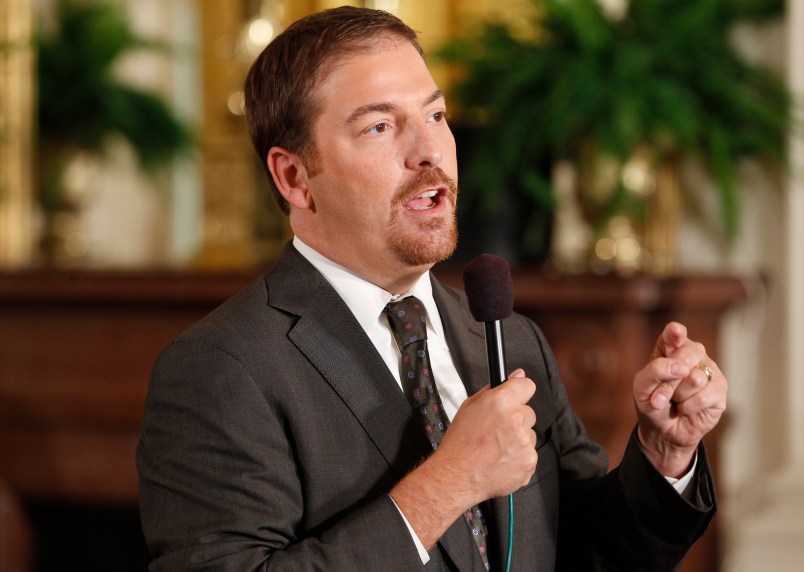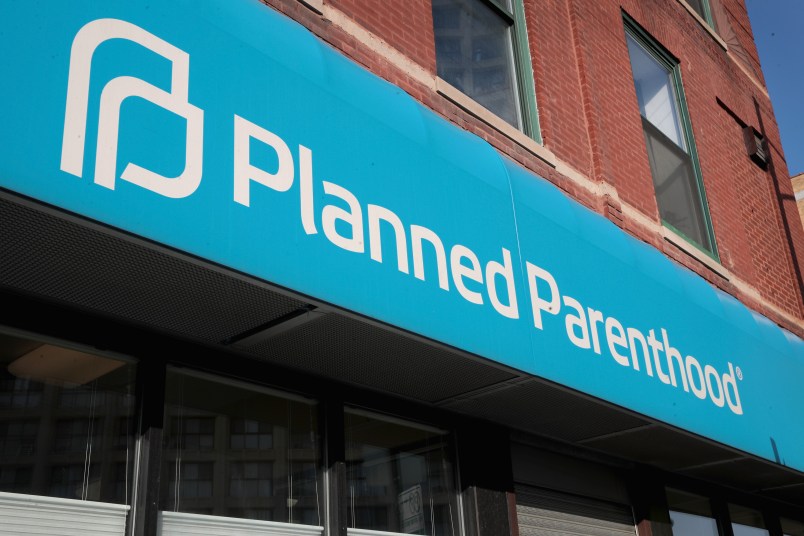Chuck Todd says that the press often gets a bad rap due to a tendency from some journalists to use whatever opposition research is handed to them.
In the latest installment of his interview with Media Matters, which was shared with TPM on Thursday in advance of its publication, the “Meet the Press” moderator responded to Hillary Clinton’s recent complaint that too many reporters are constantly on the hunt for “the best angle, the quickest hit, the biggest embarrassment.”
“Well, here’s the thing. I think that there’s an array of press out there that does everything. I think that what gets the attention and what gets clicks, is what? Right? Is sort of the gotcha moment, right?” Todd said. “But what I’m curious about — every candidate that complains about this, are they going to not have opposition researchers feeding the press? I mean, I’m not saying — look, the press should be grown up enough to say, ‘Well, what am I doing?’ But this is a two-way street. We’re destroying the process together here. The media isn’t doing it on their own.”
Todd said that opposition research often escapes scrutiny due to the drive for “viral” footage that consumes so many members of the media.
“So it doesn’t matter how responsible 70 percent of the journalism community is. There’s always a 30 percent chunk that is willing to just take whatever’s handed them. And just to take viral video and post it as fact, or just to take tracker video and just put it out there,” Todd said. “So, I agree with [Clinton’s] statement. I think that the entire process — and I start with the oligarchs, the billionaires that are like, we’re spending — those guys are spending more money collectively in these races than the campaigns themselves, OK? I think it starts there.”
David Gregory, Todd’s predecessor on “Meet the Press,” lodged a similar criticism last month, decrying both the media’s “laziness” and its willingness to go along with established narratives.
Below, a portion of Todd’s transcript with Media Matters:
MEDIA MATTERS: Now, you talk about 2016. Hillary Clinton criticized the press just recently for making it harder for qualified candidates who want to serve in office and run. She said that rather than giving people information so they can make decision — so they can be decision-makers, the press is overly focused on, quote, “the best angle, quickest hit, the biggest embarrassment.”
TODD: Right.
MEDIA MATTERS: Do you think the press focuses too much on that kind of politics of destruction and not enough on policies?
TODD: Well, I definitely think it —
MEDIA MATTERS: And how does that affect —
TODD: Well, here’s the thing. I think that there’s an array of press out there that does everything. I think that what gets the attention and what gets clicks, is what? Right? Is sort of the gotcha moment, right? But what I’m curious about — every candidate that complains about this, are they going to not have opposition researchers feeding the press? I mean, I’m not saying — look, the press should be grown up enough to say, “Well, what am I doing?” But this is a two-way street. We’re destroying the process together here. The media isn’t doing it on their own.
MEDIA MATTERS: No. And you’re obviously — you have a whole hour to get more in-depth on things —
TODD: That’s right, so I don’t have this issue that —
MEDIA MATTERS: But it is something that’s out there —
TODD: But my feeling is —
MEDIA MATTERS: No?
TODD: Opposition research — look, here’s what’s happened. Right? The world of opposition research used to be an attempt to find out what in somebody’s background can we make the case that they’re sort of, they’re hypocritical on Issue X. You know, that they haven’t practiced what they’ve been preaching. Right? Which is, on one hand — that’s essentially what it was about. But it’s now turned into basically, where’s every negative thing I can find? And there’s always an outlet to get it out there.
So it doesn’t matter how responsible 70 percent of the journalism community is. There’s always a 30 percent chunk that is willing to just take whatever’s handed them. And just to take viral video and post it as fact, or just to take tracker video and just put it out there. So, I agree with her statement. I think that the entire process — and I start with the oligarchs, the billionaires that are like, we’re spending — those guys are spending more money collectively in these races than the campaigns themselves, OK? I think it starts there.So, you’re an average public — you’re somebody that would like to get involved in public service. Here’s the system you may be climbing into. You have issues you care about, but a super PAC may decide what issues you get to debate. You don’t.
MEDIA MATTERS: Sure.
TODD: That’s number one. Number two, let’s say you’ve been successful in your community — whatever you’ve been doing. Working in the public space, working in the private space, whatever it is. Your personal reputation is going to get scrubbed, shall we say. Let me be kind about this. Everybody’s past has something that may look bad in a moment, even if it wasn’t that bad at the time. And all of that gets drug out. So you have the very real possibility that your personal reputation could be in tatters by the end of the campaign. And if you lose, you’ve got to go back to your old job. And can you effectively do it? It becomes almost like, it’s very risky now for your personal reputation, just because of the way opposition research works now, the way the press has less and less sort of, filter, in basically — and again, it doesn’t matter if the mainstream media is responsible when you have the 10,000 other outlets to get below-the-belt stuff out, right?
So, now you’re this candidate, so you have to weigh that. Oh, and then let’s say you get to the Senate and Congress, and you find out unless you’re in leadership, you have no say. You have no ability to actually get legislation passed anymore, the way the system is worked. And then you end up finding out that whoever you hire, they’re going to be with you for two years, and then they’re going to flip, go across the street, and become a lobbyist and make 10 times your salary. OK?That’s the definition of a system on the brink of breaking. Because what you then do is, you then end up with candidates — you have a harder time — the smartest, most successful people suddenly think public service is too much of a risk, and there’s too little reward.







